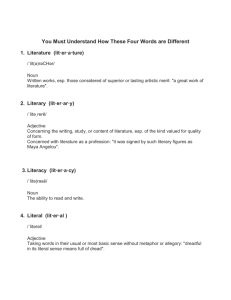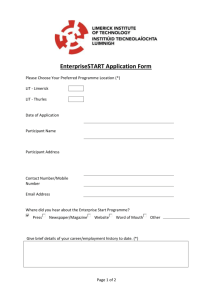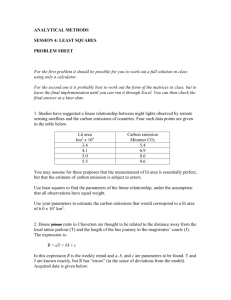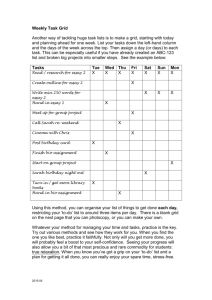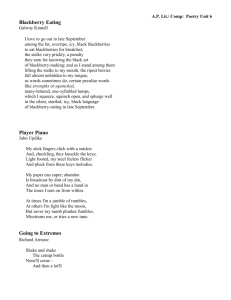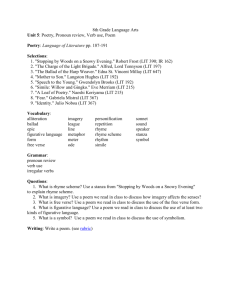English 1302 (tentative) Daily Plan
advertisement
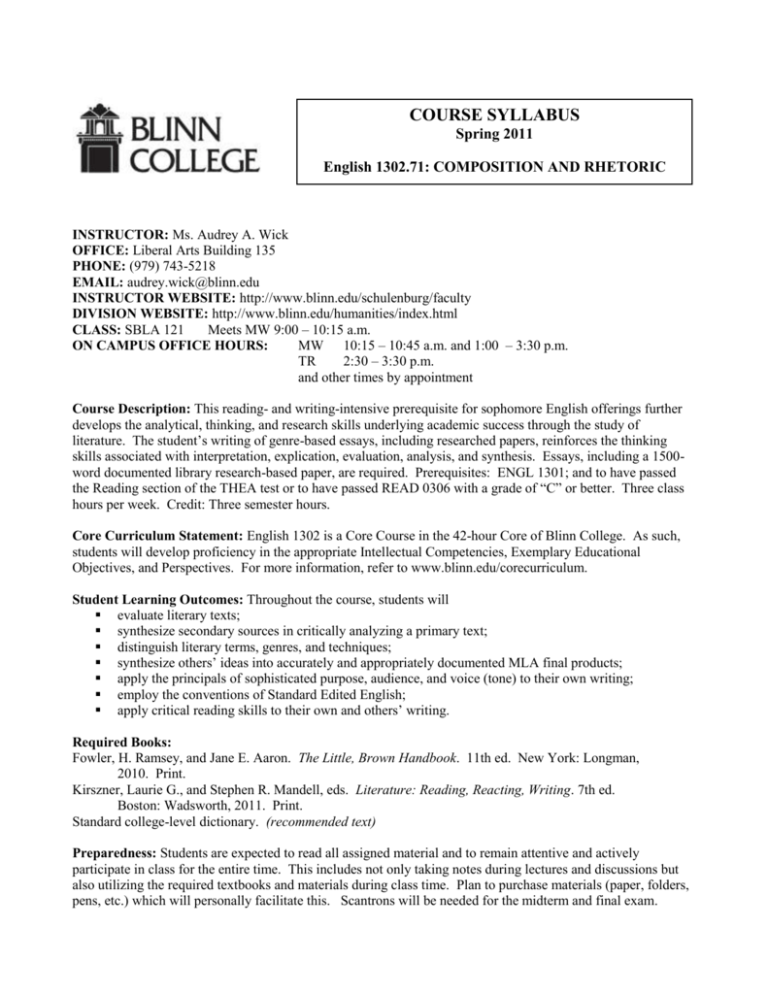
COURSE SYLLABUS Spring 2011 English 1302.71: COMPOSITION AND RHETORIC INSTRUCTOR: Ms. Audrey A. Wick OFFICE: Liberal Arts Building 135 PHONE: (979) 743-5218 EMAIL: audrey.wick@blinn.edu INSTRUCTOR WEBSITE: http://www.blinn.edu/schulenburg/faculty DIVISION WEBSITE: http://www.blinn.edu/humanities/index.html CLASS: SBLA 121 Meets MW 9:00 – 10:15 a.m. ON CAMPUS OFFICE HOURS: MW 10:15 – 10:45 a.m. and 1:00 – 3:30 p.m. TR 2:30 – 3:30 p.m. and other times by appointment Course Description: This reading- and writing-intensive prerequisite for sophomore English offerings further develops the analytical, thinking, and research skills underlying academic success through the study of literature. The student’s writing of genre-based essays, including researched papers, reinforces the thinking skills associated with interpretation, explication, evaluation, analysis, and synthesis. Essays, including a 1500word documented library research-based paper, are required. Prerequisites: ENGL 1301; and to have passed the Reading section of the THEA test or to have passed READ 0306 with a grade of “C” or better. Three class hours per week. Credit: Three semester hours. Core Curriculum Statement: English 1302 is a Core Course in the 42-hour Core of Blinn College. As such, students will develop proficiency in the appropriate Intellectual Competencies, Exemplary Educational Objectives, and Perspectives. For more information, refer to www.blinn.edu/corecurriculum. Student Learning Outcomes: Throughout the course, students will evaluate literary texts; synthesize secondary sources in critically analyzing a primary text; distinguish literary terms, genres, and techniques; synthesize others’ ideas into accurately and appropriately documented MLA final products; apply the principals of sophisticated purpose, audience, and voice (tone) to their own writing; employ the conventions of Standard Edited English; apply critical reading skills to their own and others’ writing. Required Books: Fowler, H. Ramsey, and Jane E. Aaron. The Little, Brown Handbook. 11th ed. New York: Longman, 2010. Print. Kirszner, Laurie G., and Stephen R. Mandell, eds. Literature: Reading, Reacting, Writing. 7th ed. Boston: Wadsworth, 2011. Print. Standard college-level dictionary. (recommended text) Preparedness: Students are expected to read all assigned material and to remain attentive and actively participate in class for the entire time. This includes not only taking notes during lectures and discussions but also utilizing the required textbooks and materials during class time. Plan to purchase materials (paper, folders, pens, etc.) which will personally facilitate this. Scantrons will be needed for the midterm and final exam. Wick—ENGL 1302 2 Blinn College Grading Scale: 90-100 = A, 80-89 = B, 70-79 = C, 60-69 = D, 50-59 = F. Grading System: Students are expected to keep track of their grades and save all work. Essay 1 Essay 2 Term Paper 15% 15% 25% Quizzes /Daily Assignments/Participation Final Exam 25% 20% Essay 1 and 2: Students will submit two major essays (documented 750-word min.) to test comprehension and application of material taught within genres. MLA documentation and formatting applies. Term Paper: A term paper (1500+ word documented library-research paper with a minimum of five secondary scholarly sources) will be assigned to test an understanding of library-oriented research, interpretation, analysis, synthesis, and evaluation of readings. NO internet sources will be accepted; scholarly sources will be utilized. Quizzes/Daily Assignments/Participation: Reading and lecture quizzes will be given unannounced during the semester to assess knowledge of material presented. If a student is not in class or is late when a quiz is given, he or she misses the opportunity to take the quiz. Specific in-class writing or activities may also be counted as quiz grades. Additionally, grades may be assessed in certain cases for active, meaningful participation. The fiction quiz given mid-semester will count as three quiz grades. Final Exam: This exam will be given to determine whether or not the student has sufficient knowledge of the skills needed to advance to the next level of college-credit English. It will include a 500-700 word in-class documented essay and Course Inventory test. In addition to the above assignments, the instructor will assign homework, group work, and various in class assignments (see attached Daily Plan). Manuscript Form: All papers must exhibit an understanding of MLA format. Remember: English 1302 is not a course in creative writing. Adherence to guidelines and directions in writing is imperative. Electronic Submission of Work: All major written work will be submitted (in its final form) to TurnItIn dropboxes in eCampus, a service utilized by Blinn College. Full instructions for usage will be provided in class. This system serves as a method of plagiarism control while also allowing the creation of an electronic portfolio. Graded essays will be returned via this system using a service called GradeMark. To view comments/grade: 1. Reaccess the essay dropbox. 2. Click on the GradeMark grey dialogue bubble icon next to the submitted assignment. 3. View the marks and comments in the new window, which will appear automatically. Scroll through not only textual marks but also general comments; printing or saving this file is advisable. Print Management System: Each student is automatically given a print system account as the start of the semester along with 15 credits (i.e. $15.00). The credits can be utilized in the library and lab settings for any print jobs. Credits are not refundable nor does the balance roll over to the next semester. Departmental Reminder for Submission of New Work: Students who have been enrolled in English 1302 (online, in a classroom, or otherwise) in a previous semester should remember that the work they submit this semester must be new. This means, for instance, that students cannot submit papers (or any other assignments) that were initially written in a previous semester. Students need to treat this semester as a fresh start--because recycled work from previous semesters will not be accepted. Likewise, if students have friends and/or family members who have previously taken this class, then students should remember that papers (or other assignments) from these friends and/or family members cannot be submitted in place of students' own work. Wick—ENGL 1302 3 The work that each student submits this semester must be original. Any student who submits recycled and/or copied work this semester will be subject to the Blinn College policies governing scholastic dishonesty. GRADING CRITERIA These grading criteria are used by all instructors of English at Blinn College. A The A paper represents original, outstanding work; it shows careful thought, fresh insights, and stylistic maturing. With practically no mechanical errors to distract the readers, it is free of jargon, cliches, and other empty language. Readers move effortlessly through the paper because of its effective transitions, lucid organization, and thorough, purposeful development. At the end, they feel that they have learned something and that they have received some unexpected and welcome illumination. B The B paper shows thought but not unusual originality. Its few mechanical errors do not seriously distract the readers, but the language, while neither trite nor bureaucratic, probably lacks the candor and precision of the most memorable writing. Although it has clear organization and substantial development, the B paper will not have the organic unity of the best writing. Its transitions, while appropriate, emphasize the logical turnings of the writer’s mind, making readers occasionally more aware of the efforts taken to unify and control an idea than of the idea itself. C The C paper represents average college-level work. It is a competent expression of ordinary thoughts in ordinary language. The writing is basically correct, though it may have some mechanical errors, but monotonous. Because of inadequate transitions, the paper often has a chopping effect, one that is intensified by pedestrian organization and vague development. By relying on generalities rather than on precise, illustrative details, the writer of a C paper leaves readers feeling not much better informed than when they first picked up the essay. D The D paper has only skeletal development and organization. Its serious mechanical errors, together with the awkwardness and ambiguity of its sentence structure, make readers feel slighted, as if their time and attention were of little concern to the writer. F The F paper contains writing that falls below the minimal standards for college-level literacy. It shows lack of thought and purpose, little or no organization, numerous mechanical errors, and a garbled or immature style. Sometimes inadequacy in one area is enough to fail a paper—the writer, for instance, may not have control of punctuation and produces fragments or comma splices in almost every paragraph—but usually serious weaknesses occur in several areas together. 0 A paper will earn the grade zero if it contains plagiarized content in any form, including the failure to acknowledge the source of any borrowed material (summarized, paraphrased, and directly quoted) and unmarked exact wording (directly quoted from either a primary or a secondary source), whether a specific well-chosen word, a phrase (two or more words), a clause, or full sentence(s). A paper can earn a zero if it does not address the assigned topic, if directions have been either ignored or not followed, or if work is recycled. Free Tutoring Services Students are entitled to complimentary access to tutoring services, powered by NetTutor, through Enhanced InSite. Each student can make six complimentary submissions to NetTutor’s Paper Center to get personalized feedback on how to improve the document. Live tutoring is also available. Tutors are available to help with common areas of writing, such as content development, organization, transitions, main idea/thesis, grammar and mechanics, word choice, use of resources, sentence structure, and intro./concl. NetTutor access is part of the Enhanced InSite package that is free with a new textbook; codes are good for two semesters. Students can also purchase Enhanced InSite access from cengagebrain.com by typing “0495904546” into the “Find” box and purchasing the “Enhanced InSite instant access code.” Wick—ENGL 1302 4 Late Assignments and Make-up work: All assignments are expected to be completed and are due by the assigned due date/time whether or not the student attends class. Turning in assignments early is acceptable; turning them in late is unacceptable. Please note: Pleading a case of “computer malfunction” is the dog-atemy-homework excuse of the twenty-first century, and such an excuse will not be accepted. Access to reliable technology and avoiding procrastination are a student’s responsibility. Additionally, please note that failure to appropriately submit an assignment to TurnItIn.com will result in zero credit. To ensure a file has been appropriately submitted, students should always check their digital portfolio and make sure they have correctly submitted by re-accessing (refreshing) the TurnItIn submission page and verifying their digital receipt. Scholastic Integrity and Plagiarism: The Blinn College Student Handbook defines plagiarism as “the appropriating, buying, receiving as a gift, or obtaining by any means another’s work and the unacknowledged submission or incorporation of it in one’s own written work.” Plagiarism also includes the following inexcusable offenses: failure to properly indicate directly quoted passages, phrasings, or significant wordings as such by the proper use of quotation marks and misattribution of cited material. Collusion is defined as the “unauthorized collaboration with another person in preparing written work for fulfillment of course requirements” (61). Collusion is considered to be as egregious as plagiarism. A student who cheats or plagiarizes will receive a zero for the assignment and will be required to meet with the instructor and academic dean for appropriate resolution to the problem. According to the Blinn College Student Handbook, the following penalty “may be imposed by the instructor [. . .]: an appropriate grade penalty ranging from a grade of zero on the assignment/examination up to and including the imposition of an ‘F’ for the entire course [for egregious plagiarism].” Note: “A student receiving an ‘F’ in a course because of scholastic dishonesty MAY NOT withdraw from that course” (65). Note well: Scholastic dishonesty does both the student and the instructor a disservice by hindering learning. Any form of scholastic dishonesty indicates academic weakness on the student’s part, setting the student up for failure in the course. Instructors use the software TurnItIn.com as a means of plagiarism control. Civility Statement: Members of the Blinn College community, which includes faculty, staff and students, are expected to act honestly and responsibly in all aspects of campus life. Blinn College holds all members accountable for their actions and words. Therefore, all members should commit themselves to behave in a manner that recognizes personal respect and demonstrates concern for the personal dignity, rights, and freedoms of every member of the College community, including respect for College property and the physical and intellectual property of others. Civility Notification Statement: If a student is asked to leave the classroom because of uncivil behavior, the student may not return to that class until the student arranges a conference with the instructor; it is the student’s responsibility to arrange for this conference. Note that if behavior is threatening or violent, the local police have jurisdiction and the College’s Discipline Code, as outlined in the Blinn College Student Handbook (see p. 65), takes precedence. Attendance: The College District believes that class attendance is essential for student success; therefore, students are required to promptly and regularly attend all their classes. Each class meeting builds the foundation for subsequent class meetings. Without full participation and regular class attendance, students shall find themselves at a severe disadvantage for achieving success in college. Students are expected to arrive to class on time and to stay in class the full time. Tardiness indicates an ill preparedness and is disruptive to both the instructor and students; so, too, is leaving a class early. Any student who does so without the instructor’s approval may be counted absent. A student should schedule doctors’ appointments and other similar obligations for times outside the class period. Notification of an advance absence or the reasons for an absence are the student’s responsibility. Conferencing with the instructor in a timely manner is the best way to find out what lectures, assignments, and due dates he or she missed during an absence. Wick—ENGL 1302 5 If a student has one week’s worth of absences during the semester, he/she will be sent an e-mail by the College requiring the student to contact his/her instructor and schedule a conference immediately to discuss his/her attendance issues. If the student subsequently accumulates two weeks’ worth of absences, he/she will be administratively withdrawn from class. See p. 56-58 in the Blinn College Student Handbook for an explanation about excused absences and further policy information. Withdrawal Note: Senate Bill 1231 (passed by the 80th session of the Texas Legislature) limits the number of courses from which an institution of higher learning may allow an undergraduate student to withdraw to no more than six, including any transfer courses. SB 1231 affects any student enrolled as a first-time freshman at Blinn College and all other Texas universities and colleges, beginning in the fall 2007 semester. E-mail Policy: While e-mail is an acceptable form of student-instructor contact, note that e-mail does not take the place of face-to-face contact. Therefore, e-mail shall not be used as a substitute for one-on-one conferencing. Any e-mail should be properly addressed, appropriately composed, and free of grammatical/ mechanical errors. E-mail containing errors that hinder readability will be returned to the student, unanswered. Special Services for Students with Disabilities Services and reasonable accommodations are available to students with documented disabilities. The Office of Disability Services (ODS) on the Brenham campus (Rm. 104, Administration Building) provides direct services to students with documented disabilities and makes appropriate referrals to other resources on and off campus. The ODS promotes awareness of the special needs and abilities of students with disabilities through educational events and outreach activities. Information, education, and consultation about specific disabilities are available to interested parties on request. Assistance to students with disabilities is provided in the following areas: Assessment of needs and appropriate services Provision of classroom and testing accommodations Assistance in orientation and registration procedures Counseling on disability related issues For further information or to make an appointment, call the Brenham office at (979) 830-4157. Food and Drink Policy: Students are not allowed to have any food and /or drinks in any Blinn College classroom/lab. Class Policies: All policies stated in the Blinn College Student Handbook (2010-2011) and other documents provided by the institution will be followed in this class. Wick—ENGL 1302 6 English 1302 (tentative) Daily Plan LIT = Literature: Reading, Reacting, Writing LBH = The Little, Brown Handbook Bio. = abbreviation for “biography” HW = abbreviation for “homework,” which is listed for completion by the next class day Reference the “Questions for a Literary Analysis” on p. 737-38 of LBH throughout the semester. 1-19 Class: Introduction to the course. Lecture: Defining “literature.” Course Inventory. HW: Read course syllabus. Read LBH Ch. 6 intro. “Developing Academic Skills” and 6a-6c p. 128-35. Read LIT “Interpreting Literature” and “Evaluating Literature” p. 8-14. Bring typed definition of “literature” to class on 1-24. 1-24 Class: Literature definition activity and read Sandra Cisneros’s “My Lucy Friend Who Smells Like Corn” supplement in class. HW: Read LIT Ch. 3 “Understanding Fiction” p. 162-70. Class: Lecture: Fiction vs. non-fiction and James Frey discussion. HW: Read LIT Ch. 3, “Defining the Short Story” p. 170-75, including Ernest Hemingway’s Bio. and “Hills Like White Elephants” Read/familiarize yourself with LIT Ch. 2 “Reading and Writing About Lit.” p. 15-40. Read LBH “Questions for Analyzing Fiction” p. 747-48. 1-26 1-31 2-2 2-7 2-9 2-14 2-16 2-21 Class: Lecture: Audience responsibility in reading and effective summarizing. Discuss Hemingway. HW: Read LIT Ch. 18 “Theme” p. 551-55. Read LIT Lynda Barry’s Bio. and “Two Questions” p. 555-67. Class: Lecture: Fiction terms and theme. Discuss Barry. HW: Read LIT Ch. 17 “Symbol, Allegory, and Myth” p. 259-65. Read LIT John Updike’s Bio. and “A&P” p. 124-30. Class: Lecture: Symbolism, Allegory, and Updike. Discuss Essay One. HW: Read LIT Ch. 14 “Setting” p. 305-09. Read LIT Nathaniel Hawthorne’s Bio. and “Young Goodman Brown” p. 540-50. Class: Lecture: Setting, Hawthorne, and literary classification (romance) with group activity. Discuss primary and secondary sources. HW: Review LBH 43d “Using Summary, Paraphrase, and Quotation” p. 611-20 and Ch. 6d “Becoming an Academic Writer” p. 135-36. Read LBH Ch. 44 “Avoiding Plagiarism and Documenting Sources” p. 626-35. Class: Lecture: MLA format, primary/secondary sources, thesis statements, documentation, and avoiding plagiarism. HW: Read LIT Ch. 15 “Point of View” p. 354-62. Read LIT Edgar Allan Poe’s Bio. and “The Cask of Amontillado” p. 243-49. Class: Lecture: Point of view and Poe, with group activity. HW: Read LIT Ch. 13 “Character” p. 254-56. Read LIT Katherine Anne Porter’s “The Jilting of Granny Weatherall” p. 763-69. Class: Lecture: Character. Discuss Porter with group listing activity. Troubleshooting Essay One. HW: Read LIT Kate Chopin’s Bio and “The Story of an Hour” p. 226-29 in conjunction with LBH Ch. 49e p. 742-47, which shows an essay example using Chopin. Familiarize yourself with LIT Ch. 39 “Using Literary Criticism in Your Writing” p. 2199-2219. Complete Essay One. Wick—ENGL 1302 7 2-23 Class: Essay One due to TurnItIn.com by 11:55 p.m. Lecture: Discuss Chopin and watch video adaptations. Give intro. to critical literary approaches. HW: Read LIT Ch. 9 “Style, Tone, and Language” p. 276-81. Read Tennessee Williams’ “Portrait of a Girl in Glass,” p. 2031-38 Review LBH Ch. 38c “Balancing the Abstract and Concrete . . . ” p. 516-17. 2-28 Class: HW: Class: HW: 3-2 3-7 3-9 Tone and Style. Discuss Williams, with description activity. Read LIT Amy Tan’s “Two Kinds” p. 777-85. Discuss Tan with partner activity. Recap of literary elements. Study for fiction quiz (counts as three quiz grades). Class: Fiction quiz. Read/discuss Cormac McCarthy supplement (to be given in class). HW: Choose short story author for term paper. Review LBH Ch. 42a-e “Finding Sources” p. 561-77. Class: Discuss term paper and research techniques. Library research time (in lab). HW: Find sources for term paper. Begin prewriting. ---------------------- SPRING BREAK: March 14 -18---------------------- 3-21 3-23 3-28 Class: Research time (in lab). HW: Continue term paper prewriting and begin drafting. Read LIT “Understanding Poetry” p. 794-805. Read LBH “Questions for Analyzing Poetry” p. 749. Read LIT “Poems About Love” p. 1054-55 and “Poems About War,” p. 1061-62, Anne Bradstreet’s Bio. p. 1218 and “To My Dear and Loving Husband” p. 940-41, Robert Browning’s Bio. p. 1218 and “Meeting at Night” p. 1055, Elizabeth Barrett Browning’s Bio. p. 1219 and “How Do I Love Thee?” p. 1055-56, William Butler Yeats’ Bio. p 1231 and “An Irish Airman Forsees His Death” p. 1062, and Wilfred Owen’s “Dulce et Decorum Est” p. 915-16. Class: Lecture: What is Poetry? Haiku poetry activity. War Poetry and Love Poetry—Authors listed from 3-21. HW: Read LIT Emily Dickinson’s Bio. p. 1220, “This is My Letter to the World” p. 1147, “There is no Frigate like a Book” p. 1146-47, “‘Hope’ is the thing with feathers” p. 874, “Success is counted sweetest” p. 1146, “Because I could not stop for Death” p. 1141-42, “Wild Nights-Wild Nights!” p. 1148. Read LIT Robert Frost’s Bio. p. 1221, “Fire and Ice” p. 849, “The Road Not Taken” p. 1159, and “Stopping by Woods on a Snowy Evening” p. 1159-60. Class: Lecture: Explanation of poetry terms, MLA conventions for poetry, and American Poetry—Dickinson and Frost, with Dickinson poetry activity. Discuss Essay Two. HW: Read LIT Langston Hughes’ Bio. p. 1075-78, “The Weary Blues” p. 1079, “I, Too” p. 1080-81, “Harlem [Dream Deferred]” p. 924-25, Read LIT Walt Whitman’s Bio. p. 1230 and “When I Heard the Learn’d Astronomer” p. 877. Read LIT Ezra Pound’s Bio. p. 1226-27 and “In a Station of the Metro” p. 907. Read LIT James Wright’s Bio. p. 1226-27 and “Autumn Begins in Martins Ferry, Ohio” p. 881. Wick—ENGL 1302 8 3-30 4-4 4-6 4-11 4-13 4-18 4-20 4-25 4-27 5-2 5-4 Class: HW: Lecture: American Poetry—Hughes, Whitman, Pound, and Wright. Poetry image activity. Read LIT Louis Simpson’s “American Poetry” p. 1197, Theodore Roethke’s Bio. p. 1227 and “My Papa’s Waltz” p. 1039-40, Dylan Thomas’ Bio. p. 1230 and “Do not go gentle into that good night” p. 1046, Linda Pastan’s Bio. p. 1225 and “Marks” p. 1187, Sandra Cisneros’ “In My Little Museum of Erotica” p. 1007, and Anne Sexton’s Bio. p. 1279 and “Cinderella” p. 853-57. Class: Lecture: Modern/Contemporary Poetry—Authors listed from 3-30. Grimm fairy tale activity with “Cinderella.” Troubleshooting Essay Two. HW: Read LIT “Understanding Drama” p. 1234-50, Susan Glaspell’s Bio. and Trifles p. 1319-30. Read LBH “Questions for Analyzing Drama” p. 751-52. Complete Essay Two. Class: Essay Two due to TurnItIn.com by 11:55 p.m. Lecture: How to read drama with intro. to dramatic elements, MLA conventions, and Trifles. HW: Read LIT “The Renaissance” p. 2074, Shakespeare Bio. p. 1604-05, and Act I of Hamlet, p. 1605-31. Class: HW: Class: HW: Lecture: Shakespearian Theatre. View a portion of the Hamlet video as introduction to the play. Read LIT Acts II and III of Hamlet p. 1631-80. Lecture: Hamlet discussion. Read LIT Acts IV and V of Hamlet p. 1680-1716. Class: Hamlet discussion. HW: Work on Research Paper. Class: Lab time to polish Term paper with selected activities and final documentation review. HW: Read LIT Tennessee Williams’ Bio. and Scenes 1-5 of The Glass Menagerie p. 1960-85 in preparation for next week.. Complete Term Paper. Class: Term Paper due to TurnItIn.com by 11:55 p.m. View The Glass Menagerie video. HW: Read LIT Scenes 6-7 of The Glass Menagerie p. 1985-2010. Class: View The Glass Menagerie video. Class: Discuss The Glass Menagerie with Literary Oscars. Review for the Course Inventory and for the essay portion of the final exam. HW: Review LBH Ch. 6e “Preparing for Exams” p. 136-38 in preparation for Course Inventory. Class: Complete in-class evaluative essay and Course Inventory Exam. HW: Review LBH Ch. 53 “Essay Examinations” p. 822-28 in preparation for final exam essay. Final exam: Tuesday, May 11 from 7:45 – 9:45 a.m. You will be given two hours to complete the written character/thematic analysis essay.

